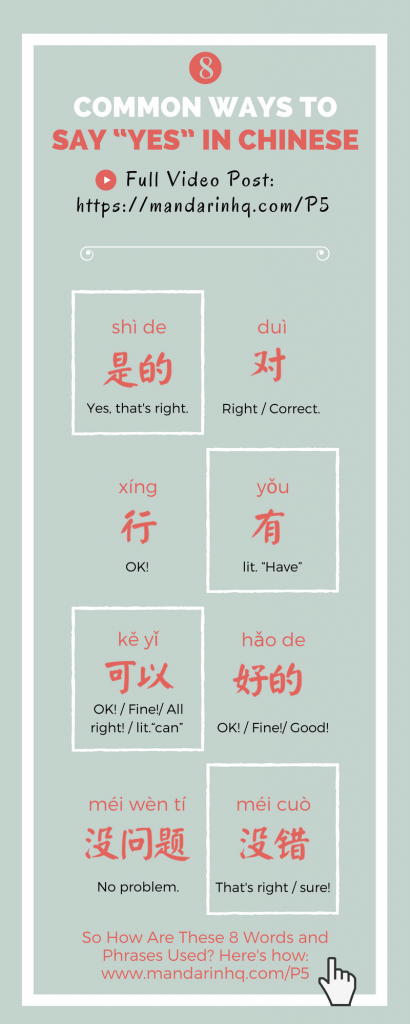It comes as a surprise to many that Mandarin doesn’t have a specific word that matches the meaning of “Yes” in English. (The same goes for "No")
Of course, there’s no shortage of ways to get the meaning across!
The Most Basic Way to Say Yes...
… when someone asks you a question, is to repeat the main word (verb or adjective) of the question.
For example:
- 你会做饭吗?会。 nǐ huì zuò fàn ma? huì.
Can you cook? Yes, I can.
- 这个菜辣吗? 辣。 zhè gè cài là ma? là.
Is this dish spicy? Yes, it's spicy.
And while this works in pretty much any context, there’s also a number of simple words and phrases you can use to make your response sound even more natural in certain situations — you’ll hear the most common ones in this video:
⤷ You can download the audio and a pdf with example sentences and usage explanations for each phrase in this video.
A Visual Summary of the Key Phrases From the Video...
So How Are These 8 Words and Phrases Used?
Let’s Take a Look:
1. 是的。shì de.
Yes, that's right. (Mostly used when someone checks a fact)
Example:
你是经理吗?是的。
nǐ shì jīng lǐ ma? shì de.
Are you the manager? Yes.
2. 对。duì.
Right / Correct. (It is commonly used when you agree with someone's statement or opinion)
Example:
我觉得坐地铁去飞机场最快。 对。
wǒ jué dé zuò dì tiě qù fēi jī chǎng zuì kuài. duì.
I think the fastest way to get to the airport is to take the subway. Right.
3. 行。xíng.
OK! (It is often used to say “yes” when someone requests something or asks for permission to do something)
Example:
我可以借你的车吗?行。
wǒ kě yǐ jiè nǐ de chē ma? xíng.
Can I borrow your car? OK!
4. 有。yǒu.
lit. “Have”(It is used to describe a positive fact or something that has happened)
Example 1:
这里有洗手间吗?有。
zhè lǐ yǒu xǐ shǒu jiān ma? yǒu.
Is there a washroom here? Yes, there is.
Example 2:
你有吃过饺子吗?有。
nǐ yǒu chī guò jiǎo zi ma? yǒu.
Have you eaten dumplings? Yes, I have.
5. 可以。kě yǐ.
OK! / Fine!/ All right! / lit.“can” (Similar usage as phrase #3 - “xíng”)
Example:
你可以帮我吗?可以。
nǐ kě yǐ bāng wǒ ma? kě yǐ.
Can you help me? Yes, I can.
6. 好的。hǎo de.
OK! / Fine!/ Good!
Example:
我们明天一起看电影,好吗?好的。
wǒ men míng tiān yī qǐ kàn diàn yǐng, hǎo ma? hǎo de.
Let’s watch a movie together tomorrow. OK!
7. 没问题。méi wèn tí.
No problem.
Example:
这个星期给我报告行吗?没问题。
zhè gè xīng qī gěi wǒ bào gào xíng ma? méi wèn tí.
Could you give me the report this week? No problem.
8. 没错。méi cuò.
That's right / sure! (Similar usage as phrase #2 - “duì”)
Example:
他的中文说得非常好。没错。
tā de zhōng wén shuō dé fēi cháng hǎo. méi cuò.
He speaks Chinese really well. That’s right.
Want to read even more about how to use these (and a couple of other) phrases for saying Yes in Chinese? Check out this post over at Ninchanese!
Have questions or comments? Leave them below 🙂


